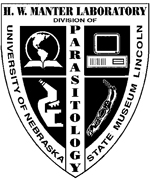Parasitology, Harold W. Manter Laboratory of

Harold W. Manter Laboratory of Parasitology: Library Materials
ORCID IDs
Escalante 0000-0002-1532-3430
Document Type
Article
Date of this Version
7-2014
Citation
PLoS One (July 2014) 9(7): e97899 (32 pages)
doi: 10.1371/journal.pone.0097899
Editor: Art F. Y. Poon
Appended: Correction: A Likelihood Approach to Estimate the Number of Co-Infections. PLoS One (2018) 13(2): e0192877. doi: 10.1371/journal.pone.0192877 (3 pages)
Abstract
Article abstract:
The number of co-infections of a pathogen (multiplicity of infection or MOI) is a relevant parameter in epidemiology as it relates to transmission intensity. Notably, such quantities can be built into a metric in the context of disease control and prevention. Having applications to malaria in mind, we develop here a maximum-likelihood (ML) framework to estimate the quantities of interest at low computational and no additional costs to study designs or data collection. We show how the ML estimate for the quantities of interest and corresponding confidence-regions are obtained from multiple genetic loci. Assuming specifically that infections are rare and independent events, the number of infections per host follows a conditional Poisson distribution. Under this assumption, we show that a unique ML estimate for the parameter (λ) describing MOI exists which is found by a simple recursion. Moreover, we provide explicit formulas for asymptotic confidence intervals, and show that profile-likelihood-based confidence intervals exist, which are found by a simple twodimensional recursion. Based on the confidence intervals we provide alternative statistical tests for the MOI parameter. Finally, we illustrate the methods on three malaria data sets. The statistical framework however is not limited to malaria.
Correction abstract:
The authors wish to acknowledge an error that was overseen in the proof of Result 1 in Schneider KA, Escalante AA (2014) A Likelihood Approach to Estimate the Number of Co-Infections. PLoS ONE 9(7): e97899. https://doi.org/10.1371/journal.pone.0097899 PMID: 24988302.
Included in
Applied Mathematics Commons, Disease Modeling Commons, Medical Pathology Commons, Parasitic Diseases Commons, Parasitology Commons


Comments
Copyright 2014, the authors. Open access
License: CC BY 4.0